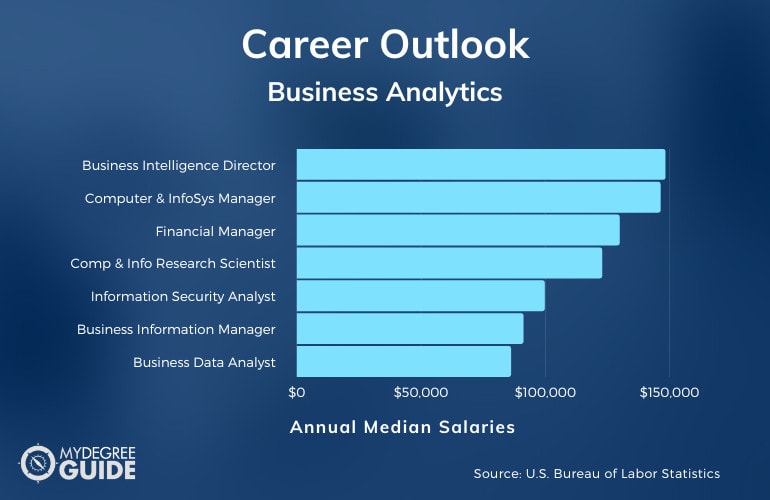Explore Masters in Business Analytics Online for 2024. Compare schools! No GRE or GMAT required. Accelerated classes available.

The use of technology continues to enhance in all sectors throughout the world, including the business industry. Professionals in the business analytics field have important responsibilities of stepping in to help businesses come up with ways for their operations to work more smoothly and effectively.
Editorial Listing ShortCode:
If you are interested in gaining advanced business knowledge and skills but lack the free time to attend classes on a college campus, an online master’s in business analytics program may be an excellent option for you.
List of 50 Schools Offering Online Masters in Business Analytics No GRE Required Programs
Methodology: Each of these universities is properly accredited and offers online programs to earn a master’s in Business Analytics with no absolute requirement to submit GRE or GMAT scores.
1. American University
American University, or AU, is a privately owned Methodist university with a strong focus on research. It was founded in February 24, 1893. Its 90-acre urban yet suburban-like campus is located in Washington, D.C. at the former site of Fort Gaines.
The AU sports teams are called the “Eagle,s,” and they play in the NCAA Division I-Patriot League, MAISA.
- Master of Science in Analytics
- Master of Science in Marketing Analytics
American University is accredited by the Middle States Association of Colleges and Secondary Schools.
2. Austin Peay State University
Austin Peay State University is a state-run university that has a 182-acre urban campus in Clarksville, Tennessee. It was established in 1927 as a junior college and normal school. Its enrollment census has the undergrads at about 10,000 and the postgrads at under 900.
Its sports teams are called the “Governors,” and they play in the NCAA Division 1 FCS.
- Master of Science in Computer Science and Quantitative Methods – Predictive Analytics
Austin Peay State University is accredited by the Southern Association of Colleges and Schools Commission on Colleges to award associate, baccalaureate, master’s, education specialist, and doctorate.
3. Bay Path University
Bay Path is a privately owned university with a 46-acre main suburban campus in Longmeadow Massachusetts. It is known for offering its bachelor’s degree programs exclusively to women, though its higher education degrees are co-ed. It was established in 1897 but became women exclusive only in 1945.
Its sports teams, called the “Wildcats,” play in the NCAA Division III.
- Applied Data Science (MS)
Bay Path University is accredited by the New England Commission of Higher Education.
4. Bellevue University
Bellevue University is a privately owned, non-profit university that has a suburban campus in Bellevue, Nebraska. It was established in 1966 with strong advocacy for adult-focused education and outreach. Current figures have student census at about 10,000; 7,000 of which are undergrads.
Their sports teams, the “Bruins,” play in the NAIA.
- Master of Science in Business Analytics
Bellevue University is accredited by the Higher Learning Commission.
5. Boston University
Boston University, or BU, is a privately owned non-sectarian university with a strong research focus. It was established in 1839 and has a 135-acre campus in Boston, Massachusetts. It has about 34,000 students enrolled split between undergrads and postgrads almost equally.
Its sports teams are called the “Terriers,” and they play in the NCAA Division I.
- Master of Science in Applied Business Analytics Management
Boston University is accredited by the New England Commission of Higher Education.
6. Brandeis University
Brandeis University is a privately owned research university that has a 235-acre suburban campus in Waltham, Massachusetts. It was established in 1948 as non-sectarian though it was sponsored financially by the local Jewish community. Current enrollment figures have the total student census at about 6,000.
Its sports teams are called the “Judges,” and they play in the NCAA Division III.
- MS in Strategic Analytics
Brandeis University is accredited by the New England Association of Schools and Colleges.
7. Capella University
Capella University is a privately owned online university that was established in 1993. Its base of operations is located in Capella Tower, Minneapolis, Minnesota. It does not have a physical campus since instruction is done online. Current student enrollment has the census at about 40,000.
- Master of Science in Analytics Online
Capella University is accredited by the Higher Learning Commission.
8. Central Connecticut State University
Central Connecticut State University or Central is a state-run school that was established in 1849 as a normal school. It operates a 165-acre suburban campus in New Britain, Connecticut. Current student figures have the census at about 12,000, about 10,000 of which are undergrads.
Its sports teams are called the “Blue Devils,” and they play in the NCAA Division I.
CCSU is accredited by New England Commission of Higher Education.
9. Creighton University
Creighton University is a privately operated school with a strong Roman Catholic affiliation due to the fact that it was founded in 1878 by the Society of Jesus, or the Jesuits. It has a 132-acre urban campus in Omaha, Nebraska. The current student census has the enrollment at about 9,000.
Their sports teams, the “Bluejays,” play in the NCAA Division I.
- Master of Science in Analytics
Creighton University is accredited by the Higher Learning Commission of the North Central Association of Colleges and Schools.
10. CUNY School of Professional Studies
The CUNY School of Professional Studies or CUNY SPS is a publicly run school with a campus at the heart of Manhattan, New York. It was established in 2003 to primarily cater to working adults.
CUNY SPS also has online undergraduate and master’s degree programs for those who can’t attend in-person classes. Today, CUNY has about 2000 students.
- Master of Science in Data Science program (Analytics)
The CUNY School of Professional Studies is accredited by the Middle States Commission on Higher Education.
11. Dakota State University
Dakota State University is a state-run school that was established as a normal school in 1881. It operates a 61-acre campus in Madison, South Dakota. Current figures have the enrollment census at about 3,300, with about 3,000 of these undergrads.
Its sports teams are called the “Trojans” and the “Lady T’s,” and they play in the NAIA- North Star.
- Master’s of Science in Analytics
Dakota State is an institution accredited by the Higher Learning Commission.
12. Davenport University
Davenport University is a privately operated, not-for-profit educational institution established in 1866 as a business college. It has a 69-acre suburban campus in Grand Rapids, Michigan. It started with 16 students in its first year but currently has more than 7,000 students enrolled.
Its sports teams are called the “Panthers,” and they play in the NCAA Division II.
- Data Analytics, MS
Davenport University is accredited by the Higher Learning Commission.
13. DeVry University
DeVry University is a private educational facility that has been offering a pathway to success since 1931. They have a multitude of degree programs that lead to associate and bachelor’s degrees.
DeVry University specializes in designing business, technology, and healthcare education and specialty concentrations in each field. They merged with the Keller Graduate School of Management in 1987 and now offer Master level degree programs.
DeVry University is accredited by The Higher Learning Commission.
14. George Mason University
George Mason University is a state-run school that operates 4 campuses with a combined land area of 1,148 acres. GMU was established in 1949 as only an extension of the University of Virginia. Today, enrollment is at 35,000, with more than 24,000 undergrads.
Its sports teams are called the “Patriots,” and they play in the NCAA Division I-A-10.
- Data Analytics Engineering (MS)
George Mason University is accredited by the Commission on Colleges of the Southern Association of Colleges and Schools.
15. Harrisburg University of Science and Technology
Harrisburg University of Science and Technology or HU is a privately owned and run, non-sectarian education institution that has a strong focus on STEM. It was established in 2001 to provide programs to prepare students in careers in Science, Technology, Engineering, and Math.
Today about 6,000 students are enrolled in its urban campus in Harrisburg, Pennsylvania.
- Master of Science in Analytics
Harrisburg University of Science and Technology is accredited by the Middle States Commission on Higher Education since 2009.
16. Illinois Institute of Technology
Illinois Institute of Technology is a privately owned and operated school that was established in 1890 with an initial investment of $1 million from Philip Danforth Armour, Sr. after hearing the “Million Dollar Sermon,” of Frank Gunsaulus, a minister with advocacy for education.
Today, there are more than 7,200 students enrolled in its 120-acre urban campus in Chicago, Illinois.
- Master of Data Science
Illinois Institute of Technology is accredited by the Higher Learning Commission.
17. Iowa State University
Iowa State University is a state-operated school that was established in 1858 in Ames, Iowa for teaching practical courses to its students. Today, there are more than 33,000 students enrolled in its 1,813-acre urban campus in Ames, Iowa.
Its sports teams are called the “Cyclones,” and they play in the NCAA Division I.
- Master of Business Analytics
Iowa State University is accredited by the Higher Learning Commission of the North Central Association of Colleges and Schools.
18. Jacksonville University
Jacksonville University is a privately owned school that was established in 1934 as a junior college that offered 2-year courses. It started out with 60 students, but today, there are about 4,000 students enrolled in its 250-acre urban campus in Jacksonville, Florida.
Its sports teams are called the “Dolphins,” and they play in the NCAA Division I.
- MS in Applied Business Analytics
Jacksonville University is accredited by the Southern Association of Colleges and Schools, Commission on Colleges.
19. Johns Hopkins University
Johns Hopkins University is a privately owned research school. It was established in 1876 via a bequeathal of $7 million from its namesake to create a hospital and a university. Today, there are more than 26,000 students enrolled in its campuses in Maryland and Washington.
Its sports teams, the “Blue Jays,” play in the NCAA Division I and III.
- Master of Science in Business Analytics and Risk Management
The Johns Hopkins University is accredited by the Middle States Commission on Higher Education.
20. Lewis University
Lewis University is a privately owned school that was established in 1932 by the Lasallians. It is strongly affiliated with the Roman Catholic Church through this founding religious order. Today, there are more than 6,000 students enrolled in its suburban campus in Romeoville, Illinois.
Its sports teams are called the “Flyers,” and they play in the NCAA Division II.
- MS Business Analytics
Lewis University is accredited by the Higher Learning Commission.
21. Maryville University
Maryville University is a privately owned school that was established in 1872 to serve the underprivileged students. Today, it has approximately 6,400 students enrolled in its suburban campus in Town and Country, Missouri.
It is affiliated with the Catholic Church, and its sports teams are even called the “Saints,” and they play in NCAA Division II.
- Master’s in Business Data Analytics Online
Maryville University of Saint Louis is accredited by The Higher Learning Commission.
22. Merrimack College
Merrimack College is a privately owned school that was established in 1947. It has strong ties to the Roman Catholic Church through the founding Augustinians. Today, it has about 4,000 students enrolled in its 220-acre, suburban campus in North Andover, Massachusetts.
Its sports teams are called the “Warriors,” and they play in the NCAA Division I.
- Online Master of Science in Business Analytics
Merrimack College is accredited by the Commission on Institutions of Higher Education of the New England Association of Schools and Colleges, Inc.
23. National University
National University or NU is a privately owned school that was founded in 1971 to provide college courses and programs that were practical and in demand.
Today, there are approximately 24,000 students enrolled across its many campuses throughout California. They also offer 100% online degree programs, so students can study based on their schedules.
- Master of Science in Business Analytics Online
Since 1977, National University has been accredited by the WASC Senior College and University Commission (WSCUC).
24. New Jersey Institute of Technology
The New Jersey Institute of Technology is a publicly managed university that was established in 1881 as an engineering school with an initial 88 students. Today, the enrollment census for its 48-acre urban campus in Newark, New Jersey is more than 11,500.
Its sports teams are called the “Highlanders,” and they play in the NCAA Divison I.
- MS in Data Science
New Jersey Institute of Technology is accredited by the Middle States Commission on Higher Education.
25. Northeastern University
Northeastern University, or NEU, is privately owned school with a strong focus on research. It was established in 1898 and used a local YMCA to conduct night classes. Today, there are more than 27,000 students enrolled in tis 73-acre urban campus in Boston Massachusetts.
Its sports teams are called the “Huskies,” and they play in the NCAA Division I.
- Master of Professional Studies in Analytics
Northeastern University is accredited by the New England Association of Schools and Colleges, Inc.
26. Notre Dame of Maryland University
Notre Dame of Maryland University is a privately owned and operated school that was established in 1873 by the School Sisters of Notre Dame, a Roman Catholic religious institution. Today, there are approximately 3,000 students enrolled in its 58-acre, urban campus in Baltimore, Maryland.
Its sports teams are called the “Gators,” and they play in the NCAA Division III.
- Master of Science in Analytics
Notre Dame of Maryland University is accredited by the Middle States Commission on Higher Education.
27. Ohio University
Ohio University, or OU, is a state-managed school with a strong foundation in research. It was established in 1804, making it the oldest in Ohio. Today, there are more than 34,000 students enrolled in its 1,850-acre college town in Athens, Ohio.
Its sports teams are called the “Bobcats,” and they play in the NCAA Division I.
- Online Master of Business Analytics
Ohio University is accredited by the Higher Learning Commission.
28. Oklahoma State University
Oklahoma State University, or OSU, is a state-run school that was established in 1890 as a land-grant educational institution. Today, there are more than 25,000 students enrolled in its 1,498-acre small city-type campus in Stillwater, Oklahoma.
Its sports teams are called the “Cowboys” and “Cowgirls,” and they play in the NCAA Division I – Big 12.
- MS in Business Analytics & Data Science
Oklahoma State University holds institutional accreditation with the Higher Learning Commission, HLC.
29. Oregon State University
Oregon State University, or OSU, is a state-run education institution that was established in 1868 as a land grant university. It has a 400-acre college town campus in Corvallis, Oregon where more than 30,000 students are enrolled.
Its sports teams are called the “Beavers,” and they play in the NCAA Division I.
- Master of Science in Data Analytics online
Oregon State University is accredited by the Northwest Commission on Colleges and Universities.
30. Pennsylvania State University
Pennsylvania State University, or Penn State, is a state-run university that operates a college town in University Park, Pennsylvania. It was established in 1885 originally as a high school. Today, there are about 100,000 students enrolled.
Its sports teams are called the “Nittany Lions,” and they play in the NCAA Division I.
- Master of Professional Studies in Data Analytics – Business Analytics
Pennsylvania State University is accredited by the Middle States Commission on Higher Education.
31. Purdue University
Purdue University – Purdue Polytechnic Institute is a state-run public institute of higher learning that was established in 1964. It is one of the 10 college campuses of Purdue University. It was established to provide instruction in practical, applied technology programs and courses.
Today, there are more than 5,000 students enrolled at the Purdue Polytechnic Institute.
- MS in IT Business Analysis (Online)
Purdue University is accredited by the Higher Learning Commission.
32. Quinnipiac University
Quinnipiac University is a privately owned and managed school that was established in 1929 as a junior college. There were only 8 who graduated their pioneering programs. Today, there are more than 10,000 enrolled in its suburban campuses in Connecticut.
Its sports teams are called the “Bobcats,” and they play in the NCAA Division I.
- MS in Business Analytics
Quinnipiac University is accredited by the New England Commission of Higher Education.
33. Robert Morris University
Robert Morris University, or RMU, is a private, non-sectarian school that was established in 1921 as a school of accountancy. Today, there are approximately 5,000 students enrolled in its 230-acre suburban campus in Moon Township, Pennsylvania.
Its sports teams are called the “Colonials,” and they play in the NCAA Division I.
- MS in Data Analytics
Robert Morris University is accredited by the Middle States Commission on Higher Education.
34. Rutgers University
Rutgers University, or RU, is a state-run university that was established in 1766 to educate future ministers and yet, classes were first taught in taverns. Today, RU has three campuses in New Jersey. These campuses have a combined enrollment of almost 70,000 students.
Its sports teams are called the “Scarlet Knights,” and play in NCAA Division I.
- Master of Business and Science (MBS) in Analytics & Data Science
Rutgers is accredited by the Middle States Commission on Higher Education.
35. Saint Joseph’s University
Saint Joseph’s University, or SJU, is a privately run Jesuit school that was established in 1851. With its Jesuit pedigree, it maintains a strong affiliation with the Roman Catholic Church. Its 114-acre urban campus in Pennsylvania has an enrollment that exceeds 8,000.
Its sports teams are called the “Hawks,” and they play in the NCAA Division I.
- Online Master of Science in Business Intelligence & Analytics
Saint Joseph’s University accreditation has been awarded by the Middle States Association of Colleges and Schools.
36. Saint Louis University
Saint Louis University, or SLU, is a privately owned school that was established in 1818 by the Jesuits. SLU still maintains a strong Roman Catholic affiliation because of its Jesuit administration. It operates a 271-acre urban campus in St. Louis, Missouri and has more than 12,600 students enrolled.
Its sports teams, the “Billikens,” play in the NCAA Division I-A-10.
- Master of Science in Applied Analytics
Saint Louis University is accredited by the Higher Learning Commission of the North Central Association of Colleges and Schools.
37. Slippery Rock University of Pennsylvania
Slippery Rock University of Pennsylvania is a state-run university that was established in 1889. It takes pride having been co-ed since the very beginning. Its current student census has enrollment at about 9,000 students at the 611-acre campus in Slippery Rock, Pennsylvania.
Its sports teams are called “The Rock,” and they play in the NCAA Division II.
- Master of Science in Data Analytics
Slippery Rock University is accredited by the Middle States Commission on Higher Education.
38. Southern New Hampshire University
Southern New Hampshire University, or SNHU, is a privately owned non-sectarian school established in 1932 as a business school. Today, there are more than 90,000 students enrolled at SNHU, though a large portion of this (87,000+) are online. Its campus is located at Manchester and Hooksett, New Hampshire.
Its sports teams play in the NCAA Division II as the “Penmen”.
- Master of Science in Data Analytics
Southern New Hampshire University is accredited by the New England Commission of Higher Education (NECHE).
39. St. Mary’s University of Minnesota
St. Mary’s University of Minnesota, or SMU, is a privately owned school that was established by the Lasallians in 1912. SMU maintains a strong Roman Catholic affiliation because of their Lasallian administration. It currently has approximately 6,000 students enrolled at its campus in Minnesota.
Its sports teams are called the “Cardinals,” and play in the NCAA Division III.
- Master of Science in Business Intelligence and Data Analytics
Saint Mary’s University of Minnesota is accredited by the Higher Learning Commission.
40. Syracuse University
Syracuse University, or ‘Cuse, is a privately owned research school that has a 283-acre urban campus in Syracuse, New York. It was established in 1870 but traces its roots to a Methodist Episcopal Seminary established in 1831 – though, it has been non-sectarian since 1920.
Its sports teams are called “The Orange,” and they play in the NCAA Division I.
- Master of Science in Business Analytics
Syracuse University is accredited by the Middle States Commission on Higher Education.
41. Texas A&M University
Texas A&M University, or A&M, is a state-run university that manages a 5,500-acre college town in College Station, Texas. It was established as the Agricultural and Mechanical College of Texas in 1871 but for some reason didn’t teach Agriculture. Today there are about 70,000 students enrolled.
Its sports teams are called the “Aggies,” and they play in the NCAA Division I.
- Master of Science in Analytics
Texas A&M University is accredited by the Southern Association of Colleges and Schools Commission on Colleges.
42. University of Dayton
The University of Dayton, or UD, is a privately owned and managed research school that was founded in 1850 by the Marianists, a recognized Roman Catholic Church congregation. Today, there are about 11,000 students enrolled at its 388-acre urban campus in Dayton, Ohio.
Its sports teams are the “Flyers,” and they play in the NCAA Division I.
- Master of Business Analytics
The University of Dayton is accredited by the Higher Learning Commission of the North Central Association of Colleges and Schools.
43. University of Maryland Global Campus
The University of Maryland Global Campus, or UMGC, is a state-run university that operates campuses in more than 140 locations worldwide as well as a headquarters in Adelphi, Maryland. It was established in 1947 but traces its roots to the 1920s when it was still called the CSCS.
Today, approximately 60,000 students are enrolled at UMGC.
- Master’s in Data Analytics
UMGC is accredited by the Middle States Commission on Higher Education.
44. University of Missouri
The University of Missouri, or MU, is a state-owned school with a strong research program. It operates a 1,262-acre urban main campus in Columbia, Missouri. Today, there are about 30,000 students at MU, of which about three-quarters are undergrads.
Its sports teams are called the “Tigers,” and they play in the NCAA Division I.
- Master of Science in Data Science and Analytics
The University of Missouri is accredited by the Higher Learning Commission.
45. University of Wisconsin
The University of Wisconsin – Madison, or University of Wisconsin as it is fondly called, is a state-run and operated research school that has a 936-acre urban campus in Madison, Wisconsin. It currently enrolls about 44,000 students.
Its sports teams are called the “Badgers,” and they play in the NCAA Division I.
- Master of Science in Data Science
The University of Wisconsin–Madison is accredited by the Higher Learning Commission.
46. Utica College
Utica College, or UC, is a privately owned school that was established in 1946 but traces its origins as far back as the 1930s when it was but an extension of Syracuse. Today, there are more than 4,000 students enrolled in the suburban campus in Utica, New York.
Its sports teams, the “Pioneers,” play in the NCAA Division III.
- MS in Data Science – Social Science Analytics
Utica College is accredited by the Middle States Commission on Higher Education.
47. Villanova University
Villanova University is a privately administered research university that has a 260-acre suburban campus in Villanova, Pennsylvania. It was established in 1842 by the Augustinians, which accounts for its strong affiliation with the Roman Catholic Church. Its census has the total number of students at about 11,000.
Its sports teams, the “Wildcats,” play in the NCAA Division I.
- Master of Science in Analytics
Villanova University is accredited by the Middle States Commission on Higher Education.
48. Wake Forest University
Wake Forest University is a privately owned and managed research university originally under the Baptist convention but has since been separated from the church. It runs a 340-acre suburban campus in Winston-Salem, North Carolina and has more than 8,000 students enrolled.
Its sports teams are called the “Devil Deacons,” and the play in the NCAA Division I.
- Master of Science in Business Analytics Online
Wake Forest University is accredited and/or recognized by the Southern Association of Colleges and Schools Commission on Colleges.
49. West Virginia University
West Virginia University, or WVU, is a state-owned research university that was established in 1867 as a land grant university. There are approximately 30,000 students enrolled in the 913-acre urban downtown campus in Morgantown, West Virginia.
Its sports teams are called the “Mountaineers,” and they play in the NCAA Division I Big 12 and ACHA.
- Master of Science in Business Data Analytics
West Virginia University is accredited by the Higher Learning Commission, which guarantees the quality of the university as a whole.
50. Western Governors University
Western Governors University, or WGU, is a privately-owned, non-profit online university that operates out of its headquarters in Salt Lake City, Utah. It was established in 1997 by a group comprised of 19 American governors.
The current census has the total enrollment at over 110,000. This is made up of about 81,000 undergrads and about 29,000 postgrads.
- Master of Science in Data Analytics
Western Governors University is accredited by the Northwest Commission on Colleges and Universities.
Sample Courses in an Online Master’s in Business Analytics Program

The courses in an online master’s in business analytics program can vary by school, but the courses below are most commonly found in the curriculum of the majority of master’s in business analytics programs.
- Business Intelligence Foundations: gives students a broad understanding of the business analytics field. It explains the responsibilities, theories, and key components of the field briefly.
- Data Mining: focuses on analyzing and collecting data. It teaches students how to research, write reports, and explain the data they found.
- Risk Management: centered on analyzing risks and learning the skills essential to solving any problems that may occur in a business. A big part of this course is using advanced mathematical techniques.
Most colleges and universities allow students to select their own elective courses to reflect their career goals. The required core courses in each master’s in business analytics program throughout the country may have different course names, but they typically teach the same skills.
Certifications for a Master’s in Business Analytics
A master’s in business analytics may help prepare you for special certifications and licenses in the field.
Certifications are not always required to pursue a certain career path. However, they do show the employer that you have acquired exceptional knowledge in the field and are dedicated to succeeding. The following list of certifications are excellent choices that may help you stand out to prospective employers.
- Analytics Professional Certification: This certification may improve your chances of recognition by future employers by showing you have professional experience in analytics. It requires continuing education and at least three years of experience in the field for master’s students or graduates.
- Management Consultant Certification: This is a certificate provided by the Institute of Management Consultants. It examines your technical skills, ethical standards, and knowledge of the field of management consulting. An interview, exam, and three years of experience are required to earn this certification.
Earning extra certificates and licenses in the field exemplifies your interest to learn and gain more skills as well as your commitment to the field of business analytics.
What Jobs Can I Get with a Master’s in Business Analytics?

There is a variety of career settings graduates of the business analytics program can pursue, such as government, healthcare, software development, and many more. To be successful in a career involving business analytics, you must obtain skills in communication, problem solving, and advanced analysis.
According to the Bureau of Labor Statistics, some of the jobs graduates in business analytics usually pursue include:
- Business Intelligence Director: This job entails a lot of duties, but the main goal is to manage, research, and assesses advanced decisions for businesses. The business intelligence director is responsible for making better business decisions for companies and solving any technical issues along the way. The average annual salary earned by business intelligence directors is $148,290.
- Computer and Information Systems Manager: This career path includes putting a company’s technology objectives in place and ensuring their computer systems are updated and working efficiently. Computer and information systems managers make an average yearly salary of $146,360.
- Financial Manager: This career is centered around finances. The financial manager helps with reporting finances, making investments, and coming up with ideas and plans for companies regarding their finances. These individuals assist businesses with developing their overall, long-term financial objectives. The average annual salary a financial manager makes is $129,890.
- Computer and Information Research Scientist: This career path involves creating and determining ways to use new, advanced technology. Computer and information research scientists also deal with technology that already exists by finding fresh and effective ways to utilize it. Computer and information research scientists earn a yearly salary of $122,840.
- Information Security Analyst: This career path is focused on maintaining safety when it comes to a company’s computer system. There are different security techniques to protect a company’s computer systems, which are coming up with different ways to protect their data, improve their network privacy, and put in place security measures for the company to practice. The average annual salary an information security analyst brings home is $99,730.
- Business Information Manager: The career path of a business information manager entails developing and implementing software systems for businesses. The idea is to help the business run more effectively. Business information managers make an average annual salary of $91,160.
- Business Data Analyst: This job requires conducting business analysis for a company or client often. The business data analyst oversees the development of solutions for current operations within a company. The goal is to analyze the company’s data and come up with better operations for the company to execute. Annually, business data analysts make an average salary of $86,170.
- Management Analyst: Those that pursue a career as a management analyst will be developing ideas to improve a company’s efficiency. The main duty as a management analyst is to solve any issues within the company. Management analysts earn an average annual salary of $85,260.
- Operations Research Analyst: This career path involves the responsibility of using lots of mathematical and research skills as well as analytical techniques to assist in solving difficult problems in the daily operations of companies. The average yearly salary made by an operations research analyst is $84,810.
- Financial Analyst: Individuals in this career path help companies and clients make good decisions involving their investments. As a financial analyst, you will need to analyze someone’s financial data to determine what kind of investments they should make; the goal is to choose investments that contain no risks. Yearly, a financial analyst makes an average salary of $81,590.
- Business Systems Analyst: This job includes researching, analyzing, and assessing the needs of a company to develop solutions for systems to support their business plans. The business systems analyst will need to establish the business plans and create a business system around those plans to ensure effectiveness. Business systems analysts receive an average annual salary of $73,570.
If you choose to study business analytics, you are not limited to the careers mentioned above. With such business insights, skills, and knowledge, there are many different job titles that graduates with a master’s in business analytics degree may earn.
Professional Organizations for Business Analytics

Professional organizations are a beneficial perk for students and graduates in the business analytics field. Joining these organizations can give you opportunities to connect with experts and professionals already in the field. Here a few respected professional organizations to consider joining.
- Computing Research Association: This professional organization creates networking opportunities and a platform for members to come together and discuss different ideas involving computing research.
- IEEE Computer Society: This is a very large organization that has gained popularity around the entire globe. It offers many different networking opportunities and conferences for its members to take advantage of.
- Institute for Operations Research and the Management Sciences: This is another favored organization for those already employed as well as students earning a degree in the field. It keeps members up to date on best research and management practices. In addition, a wonderful feature of this organization is that each member is provided with a mentor to learn from; the objective of this is for expert professionals to teach students and entry-level workers more about the analytics field.
Individuals that choose to connect with a professional organization can be kept up to date on employment openings, scholarships available, important tools and information in the field, and new training or continuing education opportunities.
Accreditation

It is very important to identify if a master’s in business analytics program is accredited before applying. If you would like your degree to be recognized by future employers and meet the required educational standards, it is essential to choose a program that has earned its accreditation.
By choosing an accredited program, you can also receive the reassurance that you will gain the necessary skills and knowledge to succeed in the field of business analytics.
There are usually two common types of accreditations granted to universities and colleges. If a program is nationally accredited, it may have earned its accreditation from the U.S. Department of Education or the Council for Higher Education.
On the other hand, a program may be regionally accredited by an agency in its specific region. For example, programs in the Northwest are typically accredited by the Northwest Commission on Colleges and Universities. There are six different agencies providing regionally accreditation.
Financial Aid

Online programs are usually known to be more affordable than a traditional program, and online students are given the same resources as those in on-campus programs. However, you should still look for easy ways to fund your education, such as scholarships, grants, awards, and student loans. Start by filling out the Free Application for Federal Student Aid (FAFSA).
The scholarships below are provided by a couple great organizations helping students pay for their college education.
- Jane M. Klausman Women in Business Scholarship: This is a women’s empowerment group offering a scholarship for females world-wide studying in the field of business. It is available to undergraduate and graduate students, and a few hundred scholarships are given to students each year.
- Stephen Bufton Memorial Education Fund: This is an organization offering several different scholarships annually to various business students. Graduate and undergraduate students are both encouraged to apply.
It is important for students to look into as many scholarship options as possible to help pay for their education. A few commonly found scholarships are single parents and U.S. military veteran scholarships, but there are many more available around the world. With a little research, you may find several scholarships that comply with your specific needs.
What Is a Master’s in Business Analytics Degree?
A master’s in business analytics degree teaches students the advanced knowledge of business. This degree prepares students with the in-depth fundamentals of various statistical techniques, modeling tools, and methods to collect data and write reports.
Understanding each of these fundamentals is important for a business analytics student to succeed in the field and fully be able to help companies with any of their operation issues.
Why Earn a Master’s in Business Analytics?
You should consider earning a master’s in business analytics degree if you are interested in the business and technology field. The field of business analytics produces in-demand careers that continue to grow. Over the next few years, the career is expected to grow tremendously.
By earning a master’s in business analytics, you may also increase your chances of standing out among other applicants. In addition, those with a master’s degree tend to earn a higher annual income; this is because individuals possessing graduate degrees are more likely to land higher-level roles in companies and organizations.
What Is the Difference Between Business Analytics and Business Intelligence?
A traditional or online business intelligence degree prepares students to identify the what’s and how’s of past events. A business analytics degree looks at the why’s of past events. By knowing why an event occurred, business analytics majors can then potentially predict what may happen in the future.
Understanding the difference between these two fields is very important as it may affect whether you’d want to pursue a business intelligence masters degree online or business analytics masters degree online.
Which Country is Best for MS in Business Analytics?

There is not one best country to earn an MS in Business Analytics. There are exceptional learning programs in many nations. It all depends on your goals and what you are hoping to achieve after graduation. Before deciding on a country, be sure to check out the salary and job prospects in the business analytics field in the specific country.
Is MS in Business Analytics a STEM Degree?
No, a master’s in business analytics is not considered a STEM degree.
Are There Any Online Master’s in Business Analytics Programs that Do Not Require the GRE?
Yes, there are several master’s in business analytics graduate programs that do not require GRE scores. Instead, these schools may determine your admittance into the program by assessing your transcripts, resume, professional and educational experience, reference letters, an essay, and a possible interview.
Sometimes, if a school mentions GRE scores on their website, they may waive them if you possess another graduate degree or a couple years of professional experience. It is best to email or call the school if you feel like you have substantial experience for the GRE to be waived.
How Long Does It Take to Get an Online Master’s in Business Analytics?
Most online master’s programs in business analytics require students complete 30 to 36 credit hours, which full-time students are typically able to complete within two years.
However, if you are a student that does not have an undergraduate degree in a business subject, the program may be extended. Students without a bachelor’s degree in a business-related field may be required to take additional courses to help them succeed in the program.
Additionally, some online programs offer the convenience of part-time options. If you are aware that you will be unable to take full-time courses, you should look for programs allowing students to study at their own pace.
Ready to Get Started?

An online master’s program provides students with the same business analytics knowledge and skills as traditional, on-campus programs. The only differences are that the online degree delivers convenience, flexibility, and the ability to earn an education from the comfort of your home or anywhere in the world.
If you are busy with other life responsibilities and never thought it would be possible to earn another degree, you should consider long-distance learning; it is structured to fit around your life.
Related Guides:
